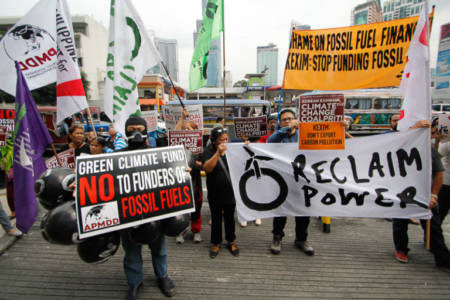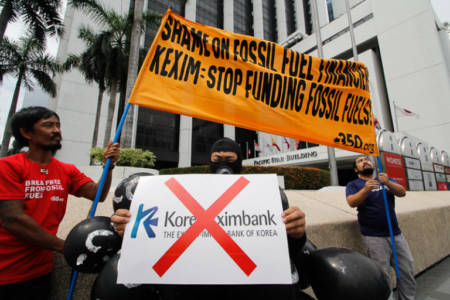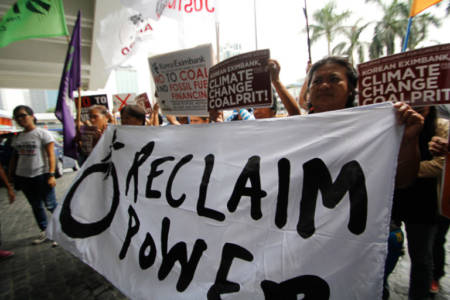By: Chuck Baclagon
Filipino climate justice activists protested in front of the local headquarters of the Export-Import Bank of Korea (KEXIM), demanding that it stop funding fossil fuel projects worldwide and be banned from receiving climate funding.
KEXIM applied to be accredited to receive money from the Green Climate Fund (GCF) despite its massive funding for coal power plant projects in the Philippines and around the world. The board of the GCF, which is mandated by the UN climate convention to support developing countries in addressing climate change impacts, will reconvene in Songdo, Korea starting tomorrow to consider applications such as KEXIM’s.

Photo: AC Dimatatac
The activists are part of Philippine Movement for Climate Justice, 350.org East Asia, Freedom from Debt Coalition and Asian Peoples Movement on Debt and Development, a global climate movement which co-signed a civil society letter demanding that the GCF board exclude export credit agencies such as KEXIM from accreditation. The demonstration was also part of Reclaim Power, a global month of action aimed at institutions funding dirty energy projects that fuel climate change.
KEXIM’s dirty-energy record include financing coal projects like the 206-megawatt coal plant in Naga, Cebu which is also jointly operated by a subsidiary of the state-run Korea Electric Power Company (KEPCO), the world’s top public electric utility. KEXIM also provided 3.8 billion USD for overseas coal-fired power plant projects in 2007-2014, which makes it is the world’s 5th largest financial institution in public finance for coal.

Photo: AC Dimatatac
“The Export-Import Bank of Korea should drop its investments on dirty coal-fired power plants if it wants to be involved in the Green Climate Fund. Otherwise, the bank is making a mockery of countries like the Philippines that are already suffering from severe climate impacts and could really use the Green Climate Fund for low carbon development as well as to better protect their people. It is high time to put an end to fossil fuel finance,” said Chuck Baclagon, campaigner for 350.org East Asia.

Photo: AC Dimatatac
“Governments and businesses must step up their support and funding for transitioning towards 100% renewable energy, and it all starts with ramping up investments on clean energy projects. We owe it the many who live with the reality where too much rain, or too little, means the difference between a life fulfilled and a life burdened by hunger and poor nutrition because of climate change,” said Baclagon.
